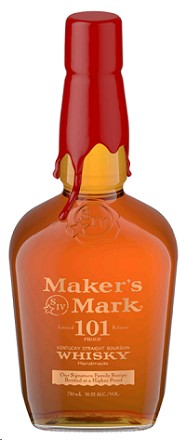| Character isn’t made by machine. Maker’s Mark began with one man’s quest to create a bourbon that he enjoyed drinking. That sounds hardly revolutionary today, but in 1954 it disrupted an industry. Bill Samuels, Sr. ’s pursuit began with his family’s trusted, 170-year-old recipe - the one he promptly set on fire, of course. Handmade. The Maker’s Mark® way. THE GRAIN Red winter wheat. Bill Samuels, Sr. , was moved by a thirst for something yet to exist - a full-flavored, easy-to-drink bourbon. He tried different flavoring grains searching for a mash bill all his own. Bill, Sr. , baked several loaves of bread with various grain combinations instead of distilling them. His quick thinking saved him years and led him to replace traditional distiller’s rye with soft, red winter wheat. This imparts a front-of-palate sweetness and eliminates that rye bite. Today, we still carefully hand-select our red winter wheat and all the other grains that go into Maker’s Mark. AGED TO TASTE Maker’s® tells us when it’s ready. (Not vice versa. ) Many aspects can affect the flavor of a whisky - age, climate, barrel condition and other factors. So, unlike most distillers, Maker’s Mark isn’t satisfied simply setting a clock. That’s why we age to taste, not time. This usually takes six to seven years and is determined by our Master Distiller and expert tasting panel. (Possibly the best job ever. ) BARREL ROTATION This is how we roll. Never shying from heavy lifting, we rotate our 500-pound barrels by hand to ensure each barrel is exposed to the variance in temperatures throughout the warehouse. This process helps achieve our premium taste and consistency while setting us apart from distillers who abandoned the practice long ago. Talk about heavy rotation! Barrels spend a minimum of three hot Kentucky summers in the top of the rickhouse where the whisky expands through the wood, gaining its color and tons of its flavor. Our tasting panel determines when the whisky is ready to move to a cooler section, keeping it from maturing too quickly. The printing press. A designer label that’s never out of style. There’s an old joke at Maker’s Mark that goes, ”If we could make it any faster, we wouldn’t. ” But, despite a dedication to being slowly crafted, the distillery isn’t totally devoid of technology. Take our 1935 Chandler & Price printing press, for example. The trusty, hand-press label maker has been a part of Maker’s Mark for most of our existence. In fact, when the original machine finally began to wear down, an exact replacement was sought out and acquired. It’s currently on display or, rather, hard at work in our label room at the distillery. The dip. HAND-DIPPED How we got our wax on. Because the flavor of Maker’s Mark really stood out from the crowd, Margie Samuels wanted to ensure the packaging did the same. While we pride ourselves on making each sip taste just like the one before it, the fact is that no two bottles are alike. That’s because of the signature red wax drips (also known as tendrils) that give each bottle a unique flourish. THE FIRST DIP The last ingredient. Margie hand-dipped the very first bottles in her kitchen using a home fryer to melt the wax. While her fried chicken was likely never the same, neither was the whisky business. The red-wax topper was the perfect last ingredient to a brand many view as iconic. Today each bottle of Maker’s Mark is still hand-dipped in 400-degree red wax by a dedicated team. If you’re able to visit the distillery, you can check out the various styles of the folks on our dipping line, from the nuanced dabber to the no-nonsense dunker. THE DISTILLERY See it for yourself. (And taste it too. ) Though we’ve added some modern amenities, the Maker’s Mark Distillery is like a perfectly preserved time capsule, where we still do things just like we did them in 1954. |




 0
0


